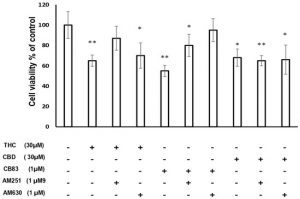Adenocarcinoma is the most common type of colorectal cancer.
The inhibition of the cancer cell proliferation and induction of apoptosis in cancer cells by CB1 and CB2 activation has been reported. A recent study by Cerretani et al., demonstrated that CBD-induced cytotoxicity in HT-29 cells occurs through a CB1 and CB2 receptor-independent mechanism.

Source: Int. J. Mol. Sci. 2020, 21(15), 5533
No sign of oxidative stress was evident when CB1 or CB2 agonists were used. CBD increased ROS production, which led to apoptotic cell death.
You can learn more here.















